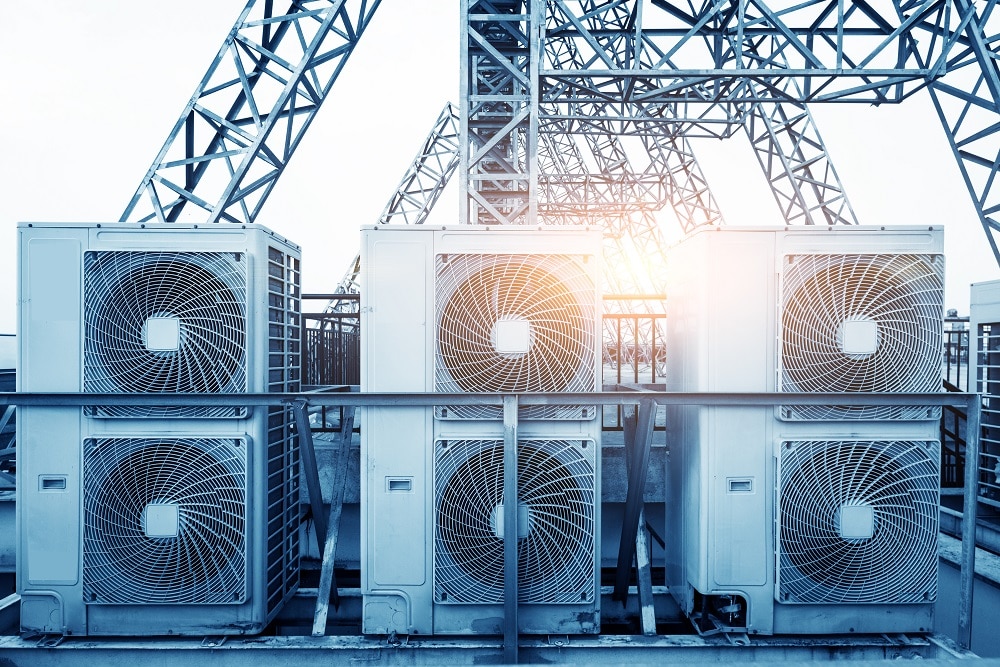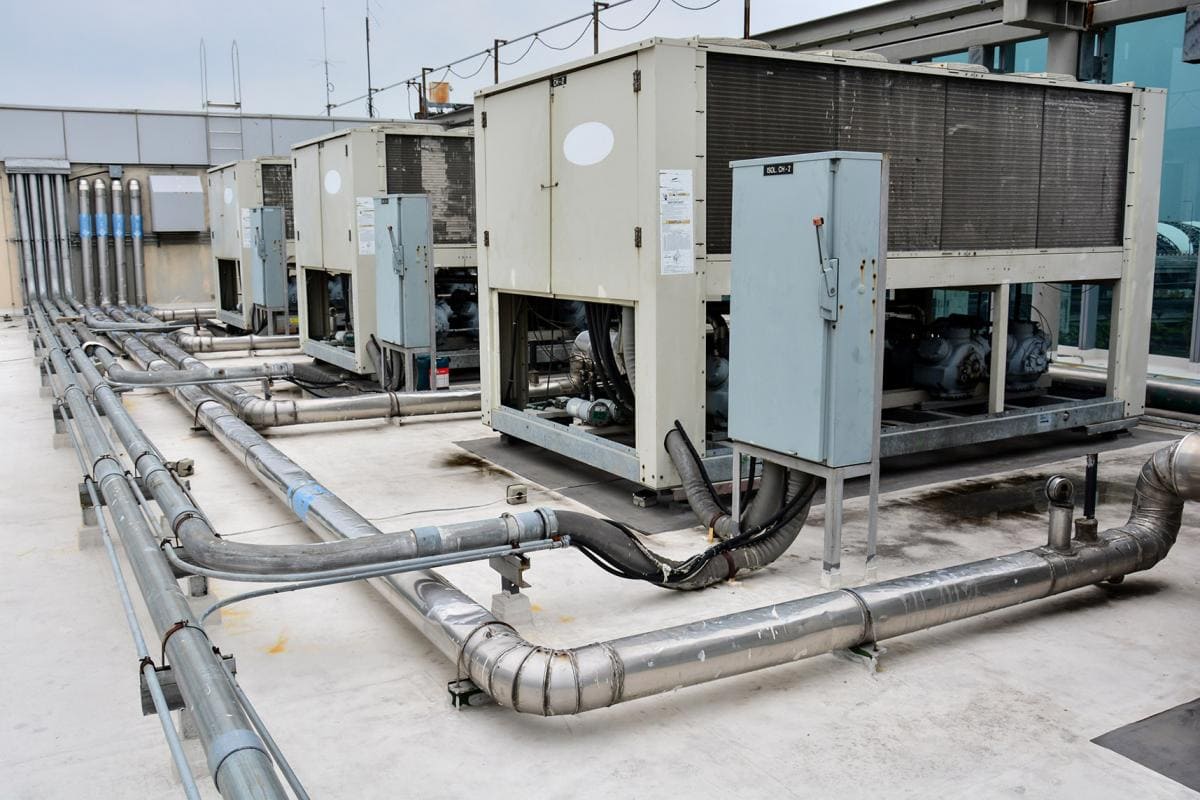Understand how HVAC experts ensure durable heating and cooling solutions
Wiki Article
Exploring the Vital Elements of a Reliable HVAC System
An efficient heating and cooling system is developed on a number of essential parts that operate in harmony. Each part, from the thermostat to the ductwork, plays a necessary function in preserving convenience and energy effectiveness. Comprehending these aspects is critical for optimizing performance and boosting indoor air high quality. As one takes a look at these elements, the detailed connections in between them expose insights right into enhancing total system efficiency. What particular aspects contribute most to this efficiency?The Duty of the Thermostat in HVAC Efficiency
Although typically neglected, the thermostat plays a vital role in the performance of cooling and heating systems. HVAC experts. This small tool works as the key nerve center, managing temperature level settings and guaranteeing excellent convenience within a space. By properly picking up the ambient temperature level, the thermostat connects with the air, ventilation, and home heating conditioning units to preserve the wanted climate
A reliable thermostat reduces power intake by triggering the cooling and heating system only when needed, therefore avoiding extreme heating or cooling. Modern wise and programmable thermostats boost this effectiveness even more by permitting individuals to establish routines and from another location change setups, adapting to daily regimens.
Furthermore, the positioning of the thermostat is essential; inappropriate area can lead to imprecise temperature readings, resulting in inefficient procedure. On the whole, a well-functioning thermostat not only enhances convenience but likewise contributes markedly to energy savings and the longevity of the heating and cooling system.
Understanding the Significance of Air Filters
Air filters serve a vital function in heating and cooling systems by ensuring that the air distributing within a room stays healthy and tidy. These filters trap dirt, allergens, and other pollutants, stopping them from being recirculated throughout the atmosphere. By capturing these fragments, air filters contribute to boosted interior air top quality, which can substantially profit residents' health and wellness, especially those with allergies or respiratory system problems.Furthermore, keeping clean air filters boosts the performance of HVAC systems. Stopped up filters can limit air flow, creating the system to function tougher to preserve preferred temperature levels, bring about increased energy consumption and greater energy expenses. Regularly changing or cleaning filters is a crucial maintenance action that can lengthen the life-span of a/c tools. Inevitably, comprehending the importance of air filters enables homeowners and building supervisors to take aggressive actions to guarantee a well-functioning, effective a/c system that promotes a secure and comfy indoor environment.

The Functionality of the Furnace and Heat Pump
Heaters and warmth pumps are crucial components of a/c systems, in charge of offering heat during cooler months. Furnaces operate by home heating air via combustion or electrical resistance, after that dispersing it throughout the home by means of ducts. They generally supply rapid heating and can be sustained by gas, electrical power, or oil, relying on the system kind.Alternatively, heat pumps transfer warmth rather than create it. They draw out heat from the outdoors air or ground, also in reduced temperature levels, and move it indoors. HVAC experts. This twin functionality enables warm pumps to additionally provide air conditioning in warmer months, making them flexible choices for year-round environment control
Both systems need proper upkeep to ensure effectiveness and longevity. While heating systems master severe chilly, heatpump can be advantageous in modest environments. Recognizing their unique performances help home owners in picking the most appropriate alternative for their home heating needs.
Discovering the Air Conditioning System
The air conditioning unit is an essential part of cooling and heating systems, offered in various kinds to suit different needs. Comprehending the performance scores of these systems is necessary for making notified selections concerning power consumption and price. This section will certainly check out the diverse kinds of ac unit and make clear how efficiency ratings influence efficiency.Kinds of Air Conditioners
While numerous aspects affect the choice of air conditioning systems, recognizing the different types readily available is critical for home owners and building supervisors alike. Central air conditioners are developed to cool whole homes or structures, utilizing a network of ducts blog here for air movement. Window devices offer a more local solution, ideal for small spaces or single rooms. Portable air conditioning system offer versatility, permitting users to relocate the device as required. Ductless mini-split systems are another alternative, integrating the performance of main systems with the convenience of zoning, as they require no ductwork. Geothermal systems harness the planet's temperature level for energy-efficient air conditioning. Each type includes distinctive benefits, making notified choices essential for effective climate control.
Efficiency Rankings Discussed
Recognizing performance scores is essential for choosing the ideal air conditioning system, as these metrics provide insight into the system's performance and power intake. The most common ranking for air conditioners is the Seasonal Power Effectiveness Ratio (SEER), which gauges the cooling output throughout a normal cooling period split by the overall electrical power input. A greater SEER shows far better performance. Furthermore, the Power Performance Proportion (EER) is used for determining efficiency under details problems. Another crucial metric is the Energy Star accreditation, which represents that a device meets strict power performance guidelines. By examining these rankings, consumers can make informed options that not only enhance comfort yet also minimize energy prices and environmental impact.The Significance of Ductwork and Air movement
Effective ductwork layout and airflow monitoring play vital roles in the general performance and performance of HVAC systems. Appropriate ductwork guarantees that conditioned air is dispersed evenly throughout a room, lessening temperature fluctuations and boosting comfort. Properly designed air ducts minimize resistance to air flow, lowering the workload on a/c equipment and ultimately reducing power consumption.Air movement administration entails purposefully placing vents and signs up to boost the flow of air. This protects against typical problems such as warm or chilly spots, which can take place when airflow is obstructed or inadequately well balanced. Furthermore, the appropriate duct materials and insulation can even more enhance effectiveness by minimizing warm loss or gain throughout air transportation.
An efficient ductwork system not only contributes to energy cost savings but can also prolong the lifespan of heating and cooling devices by decreasing unnecessary strain (HVAC experts). Recognizing the value of ductwork and airflow is crucial for attaining peak Cooling and heating system performance.
Routine Maintenance Practices to Improve Efficiency
Normal upkeep techniques are essential for ensuring peak efficiency of cooling and heating systems. These techniques include routine assessments, cleansing, and needed repair work to keep the system running successfully. Regularly transforming air filters is important, as clogged up filters can block airflow and lower effectiveness. Furthermore, service technicians ought to examine and clean evaporator and condenser coils to avoid getting too hot and energy waste.Yearly expert examinations are likewise suggested, as trained technicians can recognize potential problems prior to they rise. Lubing relocating components minimizes deterioration, adding to a longer lifespan for the system. Additionally, ensuring that the thermostat operates properly help in maintaining suitable temperature control.

Regularly Asked Questions
How Commonly Should I Change My Thermostat?
Thermostats should usually be changed every 5 to one decade, relying on usage and modern technology developments. Routine checks are advisable to assure peak performance, particularly if experiencing inconsistent temperature level control or increased energy prices.What Size Air Filter Is Best for My Heating And Cooling System?
HVAC experts The finest dimension air filter for a heating and cooling system varies by unit style. Commonly, it's essential to get in touch with the proprietor's handbook or check the existing filter dimensions to guarantee peak performance and air top quality.Can I Set Up a Heatpump Myself?
Installing a heatpump separately is feasible for knowledgeable people, but it calls for understanding of electrical systems and neighborhood codes. Working with an expert is recommended to guarantee proper installment and excellent system visit their website efficiency.How Do I Know if My Ductwork Is Effective?
To identify ductwork performance, one ought to look for leaks, action air flow at vents, inspect insulation high quality, and review temperature distinctions in between supply and return ducts. Expert assessments can supply extensive understandings into total performance.What Are Indications My Heating And Cooling Demands Immediate Maintenance?
Indications that a heating and cooling system requires immediate maintenance consist of uncommon noises, inconsistent temperature levels, increased energy expenses, undesirable smells, and frequent cycling. Attending to these concerns promptly can stop further damages and warranty top system efficiency.Air filters offer a vital feature in A/c systems by guaranteeing that the air circulating within an area stays healthy and balanced and tidy. In addition, keeping tidy air filters boosts the efficiency of Heating and cooling systems. Ductless mini-split systems are one more choice, integrating the effectiveness of central systems with the comfort of zoning, as they need no ductwork. Recognizing performance ratings is essential for choosing the ideal air conditioning unit, as these metrics offer insight right into the system's performance and power usage. The ideal dimension air filter for a Heating and cooling system varies by device style.
Report this wiki page